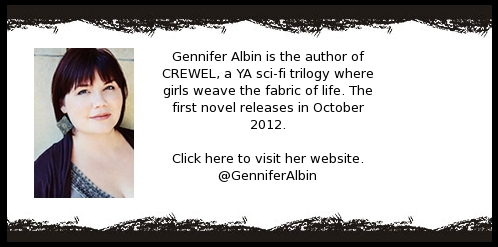There are also obvious benefits to having an inexhaustible supply of coffee nearby when you're working on a deadline and very little sleep. But what about the noise? Yes, coffee shops can get loud, but they can also be a great place for writers to observe other people, hear stories, and get ideas without feeling too creepy about eavesdropping. The "lonely writer" working in solitude is another old cliche, but writing in a coffee shop surrounded by hipsters on identical MacBooks fosters a sense of community, and it can be inspiring too, seeing everyone else plug away at their screenplays and novels. You start to get to know the other regulars, show an interest in each others' projects, and offer encouragement. It almost starts to feel like you have a social life.
Coffee shop writing isn't for everyone, but I think writers should be always be open-minded and try new processes, so if you haven't done it before, give it a try. But first, here are some etiquette and survival tips for writing in coffee shops:
- Don't bring a typewriter. Try a laptop or, if you really want to go old school, a notebook and pencil.
- Unless you actually love Starbucks coffee (and there's nothing wrong with that), consider going to a local indie shop instead. Honestly, Starbucks is super convenient — there are a lot of them and they have long hours — and I feel less guilty about hoarding a table there for long periods of time, but I also like supporting smaller businesses, and their coffee is often better.
- Buy something. Some coffee shops will actually let you bring in (or sneak in) food and snacks from outside, but don't abuse their kindness, especially if you're at an indie coffee shop. Buy a cup of coffee — consider it "rent" for the table. If you're there for more than a couple of hours, get refills periodically or buy some pastries or something; you're probably getting hungry anyway. Don't like coffee? Try tea or chai or cocoa, or just get a soda, especially if it's really crowded and you're taking up space other customers might want.
- Tip well. Always good advice, but if you're planning to come back often, don't be cheap.
- Share the outlets. Power is a hot commodity at most coffee shops; if you see someone drifting around, staring under tables along the walls, point out the outlets if you already know where they are. If you have room at your table and you're sitting alone, offer to share it. I like to bring a small multi-outlet converter with me, which makes it easier to offer power to more people. Some people bring extension cords or even surge protectors, but make sure you aren't going to trip someone or create a fire hazard. (Just in case, make sure your laptop is fully charged and you have your AC adapter before you leave home.)
- Start packing up a few minutes before the place closes, factoring in the time you need to back up your work (don't forget to back up your work!). You don't want to make anyone stay later than they have to.
- Bring headphones/earbuds. And use them. If you need to watch a funny video when you should be writing, use headphones so you don't disturb anyone else. Sometimes when it gets too busy or I don't like the music, I listen to Pandora. I've also been using some white noise generators like SimplyRain which generate some soothing sounds that help you focus during the loudest, most inane conversations around you.
- Bring friends. Writing dates are the best of both worlds: You're being productive while spending time with friends, and you can provide just the right amount of procrastination for each other while still feeling like you're working. It really comes in handy when you have someone else to ask "What's another word for...?" instead of Googling it or asking the snarky artificial intelligence in your phone.
- Write. Demand silence from your friends when you really need to get to work, turn off the Wi-Fi on your computer, and make the time and money count. Write. But getting one more cup of coffee first won't hurt...
(Thanks to Jeff Hirsch for inspiring this blog post via Twitter, and shout out to two of my favorite coffee shops ever: Grounded in NYC, and the Chestnut Hill Coffee Co.!)
What's your favorite place to write? Have you tried working in coffee shops? Share your survival tips with us below.




























